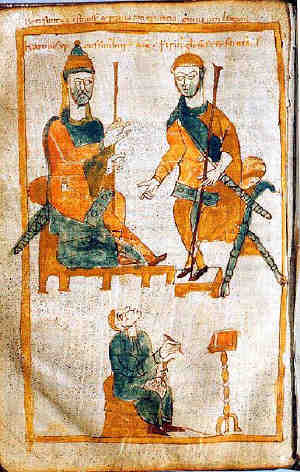Pepin The Hunchback Monk At Prüm [2789]
 Another name for Pepin was Pépin le Bossu. Another name for Pepin was Pépin le Bossu.
 FamilySearch ID: L7J6-CPQ. FamilySearch ID: L7J6-CPQ.

 General Notes: General Notes:
http://en.wikipedia.org/wiki/Pepin_the_Hunchback
In 780, Charles formally disinherited Pepin and had the pope baptize his third son, Carloman , who now received the name Pepin. The name had a special significance as Pepin had been a recurring name in the Carolingian dynasty. This move may have been prompted by Hildegard , Charles' wife and Carloman's mother, who felt her son's inheritance expectations were threatened by the hunchbacked prince.
Pepin was allowed to remain at court, and Charles continued to give the boy precedence over his younger brothers. Pepin also remained a popular "friend" of discontented nobles, and in 792, several counts played upon Pepin's dislike for his brothers to convince the deformed prince to play the figurehead in their rebellion. The conspirators planned to kill Charles, his wife Hildegarde, and his three sons by her. Pepin the Hunchback would then be set upon the throne as a more sympathetic (and more easily manipulated) king. The day of the assassination, Pepin pretended to be ill in order to meet with the plotters. The scheme nearly succeeded, but a Lombard deacon named Fardulf ultimately exposed it.
Charlemagne held an assembly at Regensburg to try the conspirators, and all were found guilty of high treason and ordered executed. Charles seemed still to have held fond feelings for his first son, however, for Pepin's sentence was commuted. Instead, Pepin was forced to enter the monastery of Prüm to live out the rest of his life as a monk. Pepin died there some twenty years later.

 Noted events in his life were: Noted events in his life were:
• disinherited, 780.
• rebelled: rebelled against his father, 792. Pepin was forced to enter the monastery of Prüm to live out the rest of his life as a monk. Pepin died there some twenty years later.
|



 Another name for Pepin was Pépin le Bossu.
Another name for Pepin was Pépin le Bossu.